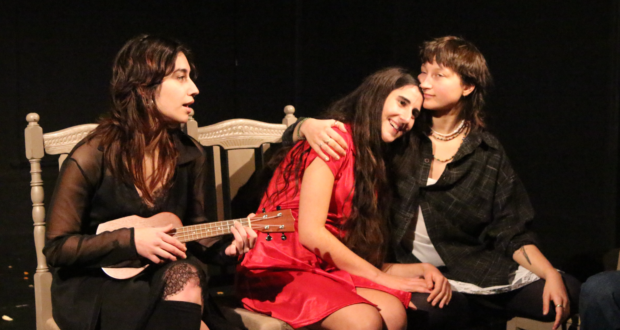An experimental journey through grief, love and loss that needed a stronger structure and pace.Summary
Rating
Good
When it comes to emerging new work, the Lion and Unicorn theatre is a space well-known for nurturing talent. Walking into its signature black box space for Psychonaut Theatre’s Mums, something unusual is clearly happening. You are met with a floor littered in orange peel and a family sat round a dinner table, moving at an uncomfortably slow pace: one person is slicing an orange, one is sipping soup. With eerie, piercing music in the background, composed by Arielle Zilkha, the abstract nature of this play is set up from the word go.
After about five minutes of this dinner table scene we see Oldest (Lavinia Grippa) set up the story of the ‘little brother’ returning home after seven years, in a monologue to the audience. Grippa’s emotional response raises a lot of questions. Her use of repetition is confusing and I was left unclear on just who the ‘little brother’ was and who this story was about. Psychonaut Theatre is an extremely experimental company and one wonders if the intention was to confuse the audience or leave the idea open to interpretation? Throughout the play we meet each of the siblings, hear their stories of grief, and see how this momentous moment in their lives has affected them as individuals and in their relationships with each other.
There are beautiful, intimate moments, peppered throughout the seventy minute piece, including Youngest, played by Juraj Benko, sewing an orange – the one Mother had sliced to share with the family – back together using needle and thread. On the surface this is a strange concept but looking deeper, it seems to represent Youngest trying to keep the family stable.
Each moment of intimate speech and the individual monologues are broken up by movement transitions. These lack feeling, drive and emotion. The ensemble perform so well in their individual moments but together, it doesn’t work. A instance where they speak of their pain, gasp for breath and fall to the ground feels forced. If they were just freer in their movement, with a loss of inhibitions, this scene would be so much more effective. As a multiform piece of theatre, with each standalone section strong within itself, the play combines movement, song, poetry and scene work to represent the theme of loss. With such a variety of form, smoother and smarter transitions between each segment would allow us to relate to the story more and immerse into it. But right now, it feels fragmentary, with individual scenes alienated from others just watched.
The script and music are notable. The monologues upon meeting each sibling really represent grief and how different people react to it. Second (Zilkha) speaks about trusting her body not to let her down, while Older (Eva Mateos Rodriguez) explains how she has not felt desire since grief took over. Both performances are captivating and the script really enhances the play’s strong running theme. A beautiful highlight of this piece is the use of multiple languages, spoken and sung; a representation of the company and their backgrounds, and how different cultures respond to grief and loss.
The company do well to represent how grief is a community, shared experience as well as an individual one. However, marrying the abstract nature of this play with the naturalistic partner-based scenes feels strange and inconsistent. On opening night of their debut play there are a lot of improvements to be made. Whilst single moments and scenes are beautiful and strong, finding the perfect way to link them together and create a relationship between the segments would resonate a lot more.
Written by: Psychonaut Theatre
Directed by: Karola Kosecka and Lavinia Grippa.
Produced by: Arielle Zilkha
Mums plays at Lion and Unicorn Theatre until 10 December. Further information and bookings can be found here.
 Everything Theatre Reviews, interviews and news for theatre lovers, London and beyond
Everything Theatre Reviews, interviews and news for theatre lovers, London and beyond



